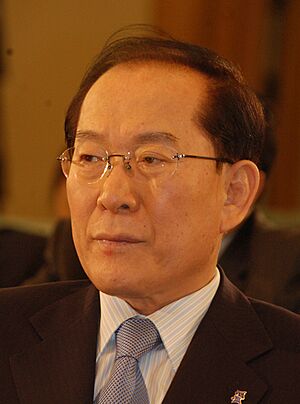Lee Hoi-chang facts for kids
Quick facts for kids
Lee Hoi-chang
|
|||||||||||||||||||||||||||||||||||||||||||||||||||
|---|---|---|---|---|---|---|---|---|---|---|---|---|---|---|---|---|---|---|---|---|---|---|---|---|---|---|---|---|---|---|---|---|---|---|---|---|---|---|---|---|---|---|---|---|---|---|---|---|---|---|---|
|
이회창
|
|||||||||||||||||||||||||||||||||||||||||||||||||||

Lee in 2010
|
|||||||||||||||||||||||||||||||||||||||||||||||||||
| Prime Minister of South Korea | |||||||||||||||||||||||||||||||||||||||||||||||||||
| In office 17 December 1993 – 21 April 1994 |
|||||||||||||||||||||||||||||||||||||||||||||||||||
| President | Kim Young-sam | ||||||||||||||||||||||||||||||||||||||||||||||||||
| Preceded by | Hwang In-sung | ||||||||||||||||||||||||||||||||||||||||||||||||||
| Succeeded by | Lee Yung-dug | ||||||||||||||||||||||||||||||||||||||||||||||||||
|
|||||||||||||||||||||||||||||||||||||||||||||||||||
| Personal details | |||||||||||||||||||||||||||||||||||||||||||||||||||
| Born | 2 June 1935 Sohung County, Kōkai Province, Korea, Empire of Japan |
||||||||||||||||||||||||||||||||||||||||||||||||||
| Political party | Independent | ||||||||||||||||||||||||||||||||||||||||||||||||||
| Other political affiliations |
New Korea (1996–1997) Grand National (1997–2007) Independent (2007–2008) Liberty Forward (2008–2012) Saenuri (2012–2017) |
||||||||||||||||||||||||||||||||||||||||||||||||||
| Spouse | Han In-ok | ||||||||||||||||||||||||||||||||||||||||||||||||||
| Children | 2 | ||||||||||||||||||||||||||||||||||||||||||||||||||
| Alma mater | Seoul National University | ||||||||||||||||||||||||||||||||||||||||||||||||||
| Religion | Roman Catholic | ||||||||||||||||||||||||||||||||||||||||||||||||||
| Signature | |||||||||||||||||||||||||||||||||||||||||||||||||||
| Korean name | |||||||||||||||||||||||||||||||||||||||||||||||||||
| Hangul |
이회창
|
||||||||||||||||||||||||||||||||||||||||||||||||||
| Hanja |
李會昌
|
||||||||||||||||||||||||||||||||||||||||||||||||||
| RR | I Hoechang | ||||||||||||||||||||||||||||||||||||||||||||||||||
| MR | I Hoech'ang | ||||||||||||||||||||||||||||||||||||||||||||||||||
| IPA | i.hø.tɕʰaŋ | ||||||||||||||||||||||||||||||||||||||||||||||||||
| Art name | |||||||||||||||||||||||||||||||||||||||||||||||||||
| Hangul |
경사
|
||||||||||||||||||||||||||||||||||||||||||||||||||
| Hanja |
俓史
|
||||||||||||||||||||||||||||||||||||||||||||||||||
| RR | Gyeongsa | ||||||||||||||||||||||||||||||||||||||||||||||||||
| MR | Kyŏngsa | ||||||||||||||||||||||||||||||||||||||||||||||||||
Lee Hoi-chang (born June 2, 1935) is a South Korean politician and lawyer. He served as the prime minister of South Korea from 1993 to 1994. He also ran for president three times as an independent candidate. Before his presidential campaigns, Lee was a judge on the Supreme Court of Korea.
Contents
Early Life and Education
Lee Hoi-chang was born in Seoheung, which is now part of North Korea. His family was well-known. His father, Lee Hong-gyu, was a public prosecutor. When his father got a new job, the family moved to the southern part of Korea.
Lee studied law at Seoul National University. He became a judge in 1960. In 1980, at age 46, he became the youngest person ever to serve as a Supreme Court Justice.
Political Career and Presidential Campaigns
In 1988, Lee was chosen to lead the National Election Commission. This group makes sure elections are fair. In 1993, President Kim Young-sam asked him to lead the Board of Audit and Inspection. This office checks how the government spends money.
Lee was known for fighting against corruption. People called him "Bamboo" because he was seen as an honest and principled person. Later in 1993, he became the prime minister. However, he resigned in 1994. He left because he felt the prime minister's office was not involved enough in important decisions, especially about North Korea.
First Presidential Campaign (1997)
In 1996, Lee led the ruling New Korea Party (NKP) in parliamentary elections. This party later joined with another to form the Grand National Party (GNP) in 1997. Lee was chosen as the GNP's candidate for president that year.
He was initially a favorite to win. However, his popularity dropped when questions arose about his two sons' military service. They had been excused for being underweight. Lee lost the election to Kim Dae-jung during a difficult time for the country, known as the Asian financial crisis.
Second Presidential Campaign (2002)
Lee ran for president again in 2002. He was against Roh Moo-hyun from the Millennium Democratic Party. Even though the government at the time faced some problems, Lee's campaign was affected by strong feelings against the United States. These feelings grew after an incident on a highway in Yangju. Many people saw Lee as being too supportive of the U.S. government. He lost to Roh by a small difference of 2% in December 2002. After this, Lee announced he was leaving politics.
Third Presidential Campaign (2007)
On November 7, 2007, Lee announced he would run for president a third time. He ran as an independent candidate, meaning he was not part of a major party. He started his campaign late, about two months before the election.
Lee had conservative views. He criticized giving foreign aid to North Korea. He believed such aid was too expensive and wrong while North Korea was developing nuclear weapons. Some people worried that Lee's campaign would split the votes of conservative voters. However, Lee Myung-bak won the election. Lee Hoi-chang came in third place with about 15% of the votes. After this election, Lee founded a new political party called the Liberty Forward Party.
Political Views
Lee Hoi-chang is known as a strong conservative in South Korean politics. His beliefs include being against communism and supporting a free market economy. He also took a firm stance against North Korea.
Lee often criticized the "Sunshine Policy" of engaging with North Korea. He argued that foreign aid should stop until North Korea got rid of its nuclear weapons program. Lee also called for stricter rules against illegal strikes. He supported appointing more women to government jobs.
 | Claudette Colvin |
 | Myrlie Evers-Williams |
 | Alberta Odell Jones |

